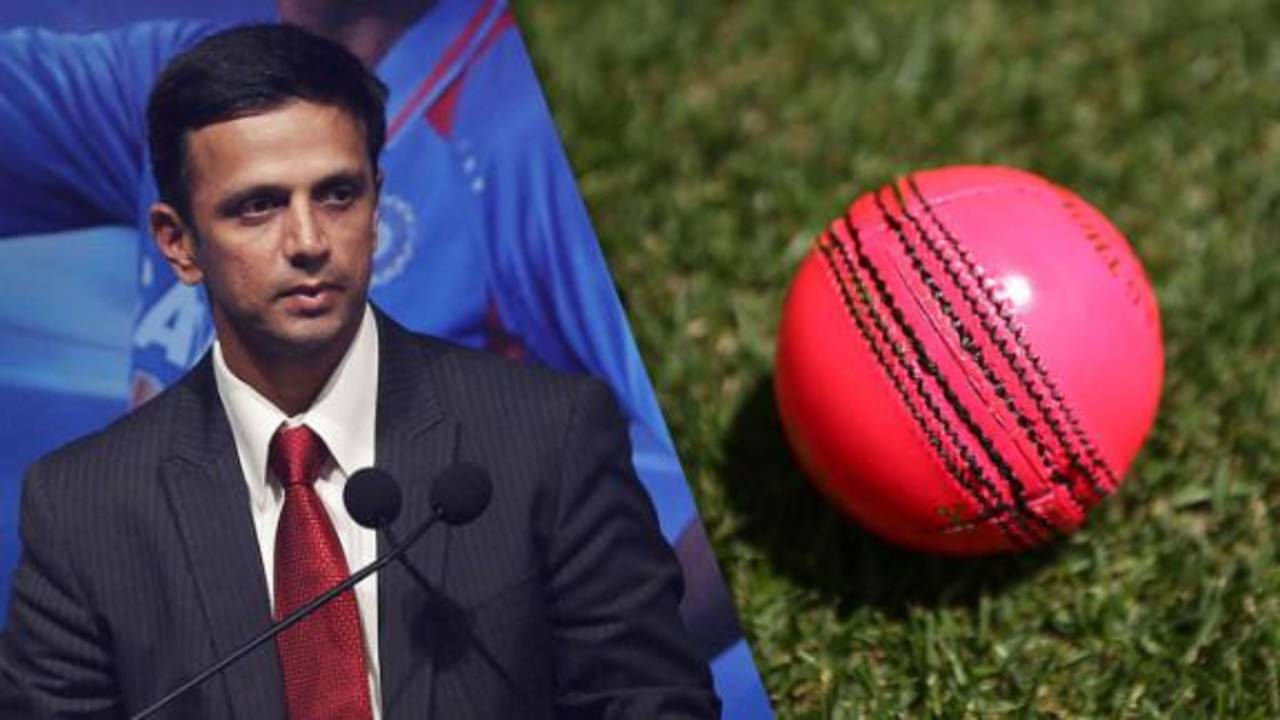Former India captain
Rahul Dravid has urged international players to keep an "open mind" about playing day-night Test cricket with the pink ball. Speaking exclusively to ESPNcricinfo, Dravid said that it was imperative that everything be done to ensure Test cricket does not "wither away and die", and if playing with a pink ball under lights attracts bigger crowds into stadiums, slightly more challenging playing conditions should not stand in the way.
Although Australia and South Africa
will play a day-night Test in Adelaide in November, and West Indies have
agreed in principle to play one against Pakistan in UAE later this year, the concept has not been enthusiastically welcomed by international players across the board.
"I think it's natural to be wary when you first start, it's stepping into the unknown a little bit," Dravid said. "But as more and more matches are played, like we saw with the success of the Test in Adelaide, I think players will warm to the idea. The conversations that I am hearing around the players' group is yes, there is a bit of skepticism, there are people who are a bit worried and are not completely sold on it, but as more games are played and people see that the ball holds up pretty well, the nature of the game isn't changing too drastically from a normal match, we play on seaming tracks or square turners, different wickets in Test cricket.
"You could start the morning of a Test match on a seaming wicket and it improves as the game goes on. Here it might start flat and it might seam as the game goes on. There are going to be things that are slightly different but there are things that are different in every Test match in each and every country that you play in that are unique to that country and surface as well. So, I don't think that's something that should count as a negative."
One of the major concerns about day-night Test cricket that has come to the fore is the measures required to protect the pink ball. In the
inaugural Test between Australia and New Zealand in Adelaide last year, additional grass was left on the pitch as well as the adjoining surfaces to ensure the ball retained its shine and visibility. The match ended in three days, making many observers argue that day-night Tests could be overly skewed in favour of the seam bowlers. Dravid advocated a more considered approach, arguing that these early experiments will lead to valuable lessons and the concept will evolve over time.
"As we play more and more of it, we won't need to 'manufacture' those conditions as much as we need to now because technology is going to get better, the condition of the ball too," he said. "We will learn more about this. But haven't we always in the Test scheme of things, I won't say 'manufacturing' things, but we have gone from an era of uncovered wickets to covered wickets, to in the early days when cricket was played on a paddock. We have evolved and changed. You could say that even changing from uncovered wickets to covered wickets was manufacturing cricket in some ways and is that really Test cricket? We've had these debates through the history of the game, and we've always had them when there are new changes, so I see it no different from anything like that."
Although it isn't confirmed if a day-night Test will be played in India's upcoming home season - which has
13 Tests scheduled - a few steps have already been taken to experiment with the concept. The Cricket Association of Bengal has
organised the first pink-ball match in India at Eden Gardens and the Duleep Trophy, too, will be
played under lights later in the year. Dravid, who played a pink-ball match himself for
MCC against Nottinghamshire in the UAE in 2011, said that it was important to ensure the experiments are done correctly to ensure the players don't "switch off" from the concept.
"I would love to see a day-night Test match in India because very clearly there are grounds in this country where people don't come and watch," he said. "I think each country and each situation could be unique, we can't just say that because a Test match succeeded in Adelaide, it might not succeed in the winter in India because of the dew. I am glad we had this match in Kolkata and the Duleep Trophy will be played under lights. One of the things we can't afford is we do the experiment without the right conditions and the players switch off from it. I think if it goes wrong initially you will find the players could switch off from it. We need to give it the best chance to succeed."
